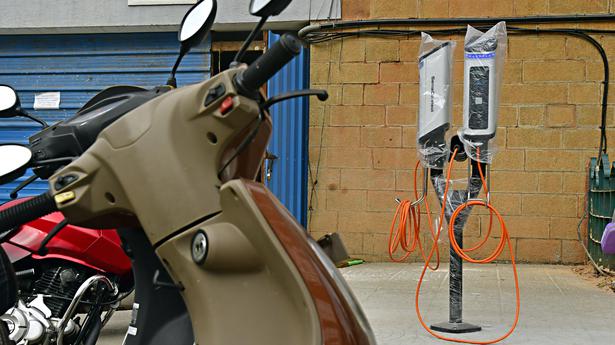
EV Charging Centre campaign between June 23 and 30 to see more stations set up
The Hindu
There are over 1,000 EV charging stations in the State, 136 under Bescom
To encourage citizens to adopt more Electric Vehicles (EV), the Energy Department will conduct an EV Charging Centre campaign in the State between June 23 and 30. While there are over 1,000 EV charging stations in the State, the department aims at installing 3,000 stations. The Bangalore Electricity Supply Company Ltd. (Bescom), which currently has 136 charging stations across its jurisdiction, also plans to increase the number to 200 charging stations in a month.
This campaign was announced by Energy Minister V. Sunil Kumar during the launch of ‘EV Jagruthi’ (Electric Vehicle Awareness), a web portal as a one-stop space to provide all the information related to EV adoption in the State. The portal has been developed by the government in a joint initiative with NITI Aayog and the UK government. The ‘Roadmap for transformation of Bengaluru to a Global EV Lighthouse City’ was also released during the event.
The web portal will provide users with insight about State’s target, incentives and other EV-related initiatives, the EV industry and market of the State and will also help them to assess the benefits of EVs and the savings they can incur when compared to petrol or diesel vehicles. “The EV Jagruthi web portal caters to the needs and priorities of a diverse set of stakeholders, including but not limited to future electric vehicle users, early electric vehicle adopters, government, academia, the research community, industry, business houses and consultants,” Bescom officials said.
The report launched mainly looks at attracting investments worth ₹31,000 crore, creating job opportunities for 55,000 people and reducing 85.58 tonnes of net carbon dioxide emissions by 2030 in the State. Explaining why Bengaluru has the potential to become a Lighthouse City, Alex Ellis, British High Commissioner to India, said, “What India does over the next generation determines what happens in the world in terms of sustainability. Karnataka is going to become wealthier over the years with its growing GDP. In India, especially in Karnataka, Britain is excited to participate in EV adoption.”
Speaking at the sidelines of the event, Energy Minister V. Sunil Kumar said that a proposal has been given to the Department of Personnel and Administrative Reforms (DAPR) to provide electric vehicles to all the offices under the Energy Department. He added that the same matter has also been brought to the Chief Minister’s attention.
“As the cost of EVs are more than petrol/diesel vehicles, we have still not gotten approval from DAPR. It is our priority to use EVs and after the approval. EVs will be used in all our offices,” he said.

“Writing, in general, is a very solitary process,” says Yauvanika Chopra, Associate Director at The New India Foundation (NIF), which, earlier this year, announced the 12th edition of its NIF Book Fellowships for research and scholarship about Indian history after Independence. While authors, in general, are built for it, it can still get very lonely, says Chopra, pointing out that the fellowship’s community support is as valuable as the monetary benefits it offers. “There is a solid community of NIF fellows, trustees, language experts, jury members, all of whom are incredibly competent,” she says. “They really help make authors feel supported from manuscript to publication, so you never feel like you’re struggling through isolation.”

Several principals of government and private schools in Delhi on Tuesday said the Directorate of Education (DoE) circular from a day earlier, directing schools to conduct classes in ‘hybrid’ mode, had caused confusion regarding day-to-day operations as they did not know how many students would return to school from Wednesday and how would teachers instruct in two modes — online and in person — at once. The DoE circular on Monday had also stated that the option to “exercise online mode of education, wherever available, shall vest with the students and their guardians”. Several schoolteachers also expressed confusion regarding the DoE order. A government schoolteacher said he was unsure of how to cope with the resumption of physical classes, given that the order directing government offices to ensure that 50% of the employees work from home is still in place. On Monday, the Commission for Air Quality Management in the National Capital Region and Adjoining Areas (CAQM) had, on the orders of the Supreme Court, directed schools in Delhi-NCR to shift classes to the hybrid mode, following which the DoE had issued the circular. The court had urged the Centre’s pollution watchdog to consider restarting physical classes due to many students missing out on the mid-day meals and lacking the necessary means to attend classes online. The CAQM had, on November 20, asked schools in Delhi-NCR to shift to the online mode of teaching.









